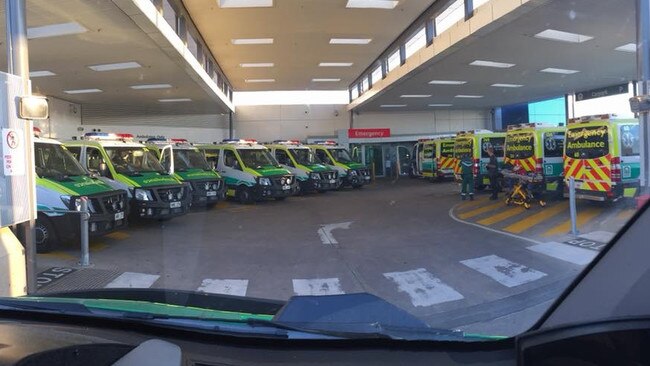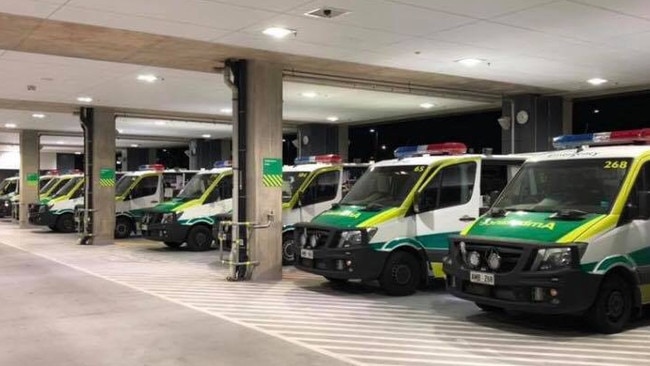Elderly woman dies after ramped for more than an hour in ambulance at Flinders Medical Centre carpark
An elderly woman taken to Flinders with a non-life-threatening condition died after her ambulance was ramped for more than an hour because of overcrowding, the union says.

SA News
Don't miss out on the headlines from SA News. Followed categories will be added to My News.
- Ambo ramping was worst on record in August, union says
- How to get the most out of your Advertiser digital subscription
AN elderly woman has died while ramped in an ambulance outside Flinders Medical Centre, according to the Ambulance Employees Association.
The union’s state secretary Phil Palmer said “this poor soul never made it inside the ED” after being ramped for more than an hour.
The death on Thursday while FMC’s emergency department was operating well above its official capacity came amid record ramping that Mr Palmer described as a “denial of basic human rights”.
However, The Advertiser understands she was taken inside when her non-life-threatening condition suddenly deteriorated and the death was in the ED.

Opposition health spokesman Chris Picton said the death came after ramping reached record levels last month and showed no signs of easing.
“This comes amid new statistics this week, which reveal ramping at our hospitals is worse than ever,” Mr Picton said.
SA Health has been contacted for comment and it is understood a report is being prepared for the Coroner.
A woman, 95, died after being “ramped” for more than an hour in an ambulance in the Flinders Medical Centre carpark because the emergency department was overflowing.
Now the ambulance union and government are in a “ghoulish” argument about the “technicality” of whether the death was in the ambulance or in the ED.
The woman’s family has not made a comment or been identified, as political and industrial figures rush to point to her death to back their causes.
The Advertiser understands the woman — taken to the FMC on Thursday with a non-life-threatening condition — had signed forms indicating she was not to be resuscitated.
It is believed she deteriorated suddenly after more than an hour ramped at the FMC carpark because the ED was overcrowded, then was quickly transferred inside as her suddenly-deteriorating condition meant she leapfrogged less-urgent cases, but was then pronounced dead.
Ambulance Employees Association state secretary Phil Palmer — who posted on social media that “this poor soul never made it inside the ED” — said members say she did not have a pulse when she was moved.
“She fell unconscious and had no pulse, if she was alive she was barely alive when she went into the ED so it is a technicality where she died,” he said.
“Her last sight was the inside of an ambulance, there is no dignity in that.”
Mr Palmer noted the death comes after record ramping last month and conceded discussing a death is “ghoulish” but chronic ramping of old, sick people needs a spotlight.
“It’s a very sad day when the overcrowded hospital crisis results in a patient passing away while waiting the queue of ambulances ramped at the FMC,” he said.
“Old folk are the biggest single cohort of patients left waiting for an ambulance and left waiting on the ramp.
“This poor soul never made it inside the ED — her and her family should not have had to go through this, it is a denial of basic human rights.
“Make no mistake, ramping is at an all-time high, this is from data supplied to the union by SA Ambulance. Data is one thing, human suffering is another.”
Mr Palmer called on the public to contact their MP and demand action on the issue “before more lives are lost”.
The ambulance union — along with nurses and teachers — is now in enterprise bargaining negotiations with the Government.
SA Health released a brief statement saying: “We are unable to provide any comment on this case as it has been referred to the Coroner’s Office.”
Health and Wellbeing Minster Stephen Wade noted the patient was inside the ED but said he did not want to add any pain to the grieving family and it is now a matter for the Coroner.

